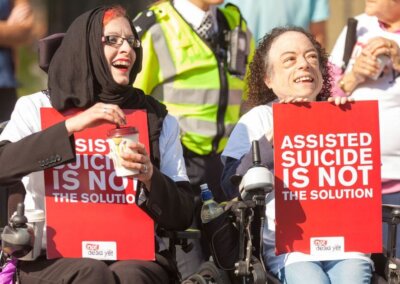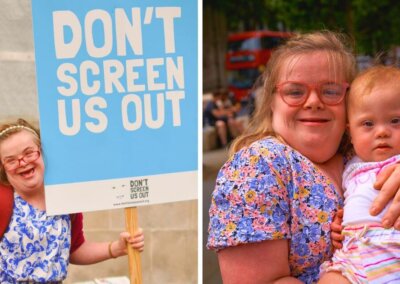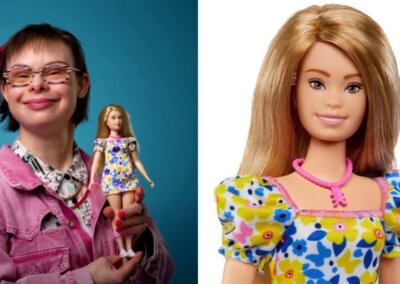The Royal College of Obstetricians and Gynaecologists (RCOG) has joined the Royal College of Midwives and the Society and College of Radiographers in releasing guidelines emphasising the importance of a non-directive approach to prenatal screening for Down’s syndrome, Edwards’ syndrome and Patau’s syndrome.
Parents must not be pressured to abort
The guidelines stress throughout that the results of prenatal testing should be given and discussed in a “non-directive” manner, such that, whether a test indicates that a baby has Down’s syndrome or not, no parent should feel pressured into a decision about whether or not to have an abortion.
“These options should be provided in a non-directive manner and their choices should be accepted, noted and respected by the medical staff”.
The emphasis on a non-directive approach occurs within the context of some parents who decide they do not want an abortion “being asked repeatedly if they want further diagnostic tests or an abortion”.
“[These parents] report having their decisions challenged and being pressured into changing their minds”.
The guidelines go on to state: “This should not happen”.
“Parents should have the scope to change their minds, but not be pressured into doing so – their decisions should be accepted and respected at all times”.
Misleading communication of Non-Invasive Prenatal Testing accuracy and results
The guidelines make it clear that Non-Invasive Prenatal Tests (NIPT) should “be offered by skilled healthcare professionals to make sure that the appropriate information and support is available”.
This includes staff being trained to “explain and discuss the associated performance, benefits and limitations of NIPT”.
The Nuffield Bioethics Council has highlighted “serious issues” with how some clinics and NIPT providers are marketing and offering the tests.
This included the misleading use of statistics in marketing materials used by providers.
They outlined that most marketing materials from providers stated that the tests were ‘99% accurate’ or have ‘99% sensitivity’. They highlight that providing these figures in marketing materials is misleading given that “most people would assume that this means their result will tell them pretty much for sure whether their fetus has one of the conditions or not. But as the conditions affect less than 1% of all children born, a dummy test that gave everybody a low chance result would be 99% accurate”.
Nuffield suggests that it is more helpful to provide what is known as a ‘positive predictive value’ when outlining how the tests work.
“Sometimes NIPT gives a high chance result when the fetus does not actually have the condition. If you receive a high chance result for Down’s syndrome, there is a 1 in 5 (20%) chance that the result is wrong and your fetus does not have the condition. For Patau’s syndrome, there is a 1 in 2 (50%) chance the result is wrong, and for Edwards’ syndrome, it’s a 3 in 5 (60%) chance”.
They criticised some providers for giving results as being ‘positive’ or ‘negative’, which they said was “highly misleading or, at best, confusing”.
Evidence from overseas shows that inaccurate communication and overselling of the precision of NIPT was resulting in parents incorrectly believing that their baby had a disability and proceeding with an abortion based on the results of the tests.
Number of support options available
The new guidance includes the listing of a number of support organisations who can provide information and support for women and their families with a higher chance result or prenatal diagnosis of Down’s syndrome, Edwards’ syndrome or Patau’s syndrome.
This includes the Down’s Syndrome Association, Down’s Syndrome Research Foundation, Positive about Down’s Syndrome, Support Organisation for Trisomy 13/18 and controversial organisation Antenatal Results and Choices (ARC).
Antenatal Results and Choices was founded as ‘Support After Termination for Abnormality’ (SAFTA) in 1988, before renaming themselves as ‘Support Around Termination For Abnormality’ in 1993, and finally re-branding as ARC in 1998.
The group has been criticised for advocating for the retaining of the current law in England, Wales and Scotland, which allows abortion for babies with disabilities through to birth, along with working closely with the lobbying arm of the UK’s largest abortion provider, BPAS, to attempt to introduce abortion through to birth for disabilities including Down’s syndrome in Northern Ireland.
Antenatal Results and Choices has also been accused of having a serious conflict of interest as they have received funding from “no fewer than nine biotechnological companies invested in the spread of Non-Invasive Prenatal Testing (NIPT)”.
The group has also recently been criticised for being the key adviser to producers of classic British soap opera Emmerdale’s storyline, which has a plot centred on the disability-selective abortion of a baby with Down’s syndrome. Over thirty thousand people signed a petition calling on ITV to cancel the storyline.
The number of babies born with Down’s syndrome has dropped by 30% in NHS hospitals that have introduced NIPT.
These guidelines have been published in the wake of recent findings revealing that pregnant mothers who refuse to abort their children with Down’s syndrome are being pressured by some medical professionals to change their decision.
One mother, whose child is now three-years-old, said medical professionals told her they could leave her baby with Down’s syndrome to die if it was struggling after birth.
Another mum told how even at 38 weeks pregnant she was being offered an abortion. Currently, abortion for disabilities including Down’s syndrome, cleft lip and club foot is legal right through to birth in England, Wales and Scotland, and 90% of babies who are identified as having Down’s syndrome in the womb are aborted.
Prenatal diagnostic tests are offered to all women during pregnancy to find out if their baby has any of these conditions. Non-invasive prenatal testing (NIPT) is a blood test to assess the chance of a baby having Down’s syndrome, Edwards’ syndrome and Patau’s syndrome.
Last year, an investigation found that the number of babies born with Down’s syndrome has dropped by 30% in NHS hospitals that have introduced NIPT.
This drop has led a number of politicians to express concern about the discriminatory abortions of babies with these conditions.
In a debate, commemorating Down’s Syndrome Awareness Month, DUP MP Jim Shannon stated that he believed this is putting the UK on the path to the situation in other countries, where almost 100% of babies diagnosed with Down’s syndrome are aborted, which is “chilling to the core”.
In recent months, the health services in England & Wales and Scotland have announced their intention to roll out the new tests across all NHS hospitals.
Right To Life UK’s spokesperson, Catherine Robinson, said:
“Sadly, the abortion rate for babies with these genetic conditions remains very high, but the insistence that information and advice surrounding prenatal testing for Down’s syndrome, Edwards’ syndrome and Patau’s syndrome be ’non-directive’ is definitely a step in the right direction. As the guidelines admit and as we know independently, many women who receive a prenatal diagnosis that their baby has Down’s syndrome are put under pressure to have an abortion”.
“It is also welcome to see that they have outlined that properly trained health professionals should be providing the results from the tests to parents. The Nuffield Bioethics Council has highlighted serious issues with how some clinics and test providers are marketing and offering the tests”.
“Evidence from overseas shows that inaccurate communication and overselling of the accuracy of NIPT tests has resulted in parents incorrectly believing that their baby had a disability and proceeding with an abortion based on the results of the tests. It is likely that the same is happening in the UK and lives are being lost to abortion because of the misleading marketing and delivery of results from these tests”.
“In their consultation on this document, it is good to see that RCOG consulted a number of charities which are supportive of people with Down’s syndrome, Edwards’ syndrome and Patau’s syndrome, as well as their parents. Hopefully, RCOG’s emphatic statement that mothers should not be pressured to abort following a diagnosis of these conditions, will be implemented in practice by medical professionals across the country”.












